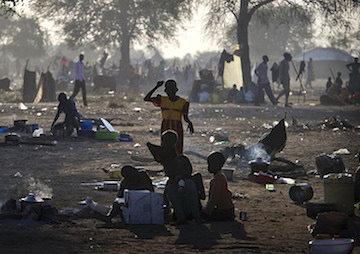What Trumps the Horrors of the South Sudanese Hellscape? The Donald
In a place where catastrophic food insecurity may tip into starvation at any time, where armed men still arrive in the night to steal and rape, a local aid worker wants -- seemingly needs -- to know if Donald Trump could actually be elected president of the United States. South Sudanese families fleeing fighting seek refuge. (Oxfam East Africa / CC-BY-2.0)
1
2
3
South Sudanese families fleeing fighting seek refuge. (Oxfam East Africa / CC-BY-2.0)
1
2
3

South Sudanese families fleeing fighting seek refuge. (Oxfam East Africa / CC-BY-2.0)
LEER, South Sudan — I’m sitting in the dark, sweating. The blinding white sun has long since set, but it’s still in the high 90s, which is a relief since it was above 110 earlier. Slumped in a blue plastic chair, I’m thinking back on the day, trying to process everything I saw, the people I spoke with: the woman whose home was burned down, the woman whose teenage daughter was shot and killed, the woman with 10 mouths to feed and no money, the glassy-eyed soldier with the AK-47.
Then there were the scorched ruins: the wrecked houses, the traditional wattle-and-daub tukuls without roofs, the spectral footprints of homes set aflame by armed raiders who swept through in successive waves, the remnants of a town that has ceased to exist.
And, of course, there were the human remains: a field of scattered skulls and femurs and ribs and pelvises and spinal columns.
And I’m sitting here — spent, sweaty, stinking — trying to make sense of it all about 10 feet from a sandbagged bunker I’m supposed to jump into if the shooting starts again. “It’s one of the worse places in the world,” someone had assured me before I left South Sudan’s capital, Juba, for this hellscape of burnt-out buildings and unburied bones that goes by the name of Leer.
A lantern on a nearby table casts a dim glow on an approaching aid worker, an African with a deep knowledge of this place. He’s come to fetch his dinner. I’m hoping to corral him and pick his brain about the men who torched this town, burned people alive, beat and murdered civilians, abducted, raped, and enslaved women and children, looted and pillaged and stole.
Before I can say a word, he beats me to the punch with his own set of rapid-fire questions: “This man called Trump — what’s going on with him? Who’s voting for him? Are you voting for him?” He then proceeds to tell me everything he’s heard about the Republican frontrunner — how Trump is tarnishing America’s global image, how he can’t believe the things Trump says about women and immigrants.
Here, where catastrophic food insecurity may tip into starvation at any time, where armed men still arrive in the night to steal and rape. (“They could come any night. You might even hear them tonight. You’ll hear the women screaming,” another aid worker told me earlier in the day.) Here, where horrors abound, this man wants — seemingly needs — to know if Donald Trump could actually be elected president of the United States. “I’m really afraid,” he says of the prospect without a hint of irony.
Of Midwifery and Militias
After decades of effort, the United States “helped midwife the birth” of the Republic of South Sudan, according to then-Senator, now Secretary of State John Kerry. In reality, for the South Sudanese to win their independence it took two brutal conflicts with Sudan, the first of which raged from 1955 to 1972, and the second from 1983 to 2005, leaving millions dead and displaced. Still, it is true that for more than 20 years, a bipartisan coalition in Washington and beyond championed the southern rebels, and that, as the new nation broke away from Sudan, the U.S. poured in billions of dollars in aid, including hundreds of millions of dollars of military and security assistance.
The world’s youngest nation, South Sudan gained its independence in 2011 and just two and a half years later plunged into civil war. Since then, an estimated 50,000 to 300,000 people have been killed in a conflict pitting President Salva Kiir, a member of the country’s largest tribe, the Dinka, against Riek Machar, an ethnic Nuer and the vice president he sacked in July 2013. That December, a fight between Dinka and Nuer troops set off the current crisis, which then turned into a slaughter of Nuers by Kiir’s forces in Juba. Reprisals followed as Machar’s men took their revenge on Dinkas and other non-Nuers in towns like Bor and Bentiu. The conflict soon spread, splintering into local wars within the larger war and birthing other violence that even a peace deal signed last August and Machar’s recent return to the government has been unable to halt.
The signature feature of this civil war has been its preferred target: civilians. It has been marked by massacres, mass rape, sexual slavery, assaults of every sort, extrajudicial killings, forced displacement of local populations, disappearances, abductions, torture, mutilations, the wholesale destruction of villages, pillaging, looting, and a host of other crimes.
Your support matters…Independent journalism is under threat and overshadowed by heavily funded mainstream media.
You can help level the playing field. Become a member.
Your tax-deductible contribution keeps us digging beneath the headlines to give you thought-provoking, investigative reporting and analysis that unearths what's really happening- without compromise.
Give today to support our courageous, independent journalists.






You need to be a supporter to comment.
There are currently no responses to this article.
Be the first to respond.